广州版小学英语五年级下册知识点归纳.doc
- 格式:doc
- 大小:240.67 KB
- 文档页数:26
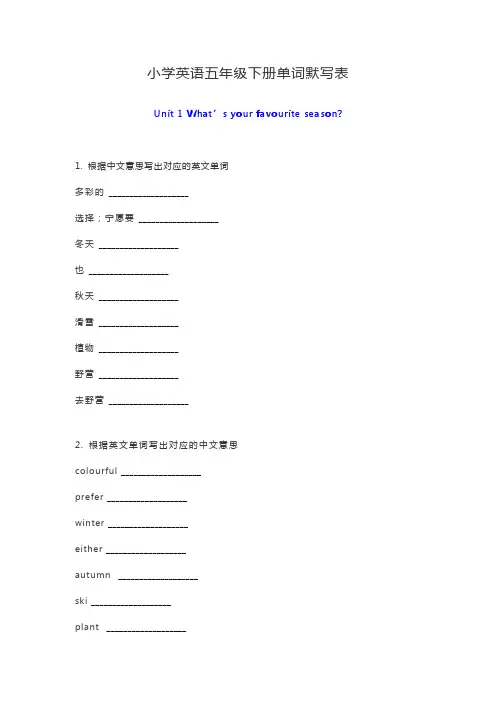
小学英语五年级下册单词默写表Unit 1 What’s your favourite season?1. 根据中文意思写出对应的英文单词多彩的___________________选择;宁愿要___________________冬天___________________也___________________秋天___________________滑雪___________________植物___________________野营___________________去野营___________________2. 根据英文单词写出对应的中文意思colourful ___________________prefer ___________________winter ___________________either ___________________autumn ___________________ski ___________________plant ___________________go camping ___________________Unit 2 It’s the middle of winter1. 根据中文意思写出对应的英文单词中间的;中等的___________________ 同班同学___________________ 澳大利亚___________________ 回答___________________ 中国___________________ 太……以致不……___________________ 如果___________________2. 根据英文单词写出对应的中文意思middle___________________ classmate___________________ Australia __________ _________ answer___________________ China ___________________ too…to…___________________ if ___________________Unit 3 We are going to have an English test.1. 根据中文意思写出对应的英文单词计划 ___________________考试 ___________________日期 ___________________怎么啦?___________________打算;将 ___________________重要的 ___________________月 ___________________博物馆 ___________________会议 ___________________开放日 ___________________农场 ___________________第二 ___________________第三 ___________________第五 ___________________第八 ___________________第九___________________2. 根据英文单词写出对应的中文意思plan ___________________test ___________________date ___________________Why? ___________________be going to ___________________ forget ___________________ important ___________________ month ___________________museum ___________________meeting ___________________open day ___________________farm ___________________second ___________________third ___________________fifth ___________________eighth ___________________ninth ___________________Unit 4 Have a good time in Hainan 1. 根据中文意思写出对应的英文单词过得愉快___________________旅行___________________大山___________________爬___________________爬山___________________海滨___________________鹿(单复数一样)___________________中午___________________2. 根据英文单词写出对应的中文意思have a good time ___________________travel ___________________mountain ___________________climb ___________________mountain climbing ___________________beach___________________deer ___________________noon ___________________Unit 5 Would you like to go with us ?1. 根据中文意思写出对应的英文单词邀请 ___________________将会,愿意 ___________________你愿意……吗?___________________嗨 ___________________小伙子;家伙 ___________________没有东西;没有事情 ___________________听起来 ___________________大门 ___________________上午;午前 ___________________太妙了,酷 ___________________。
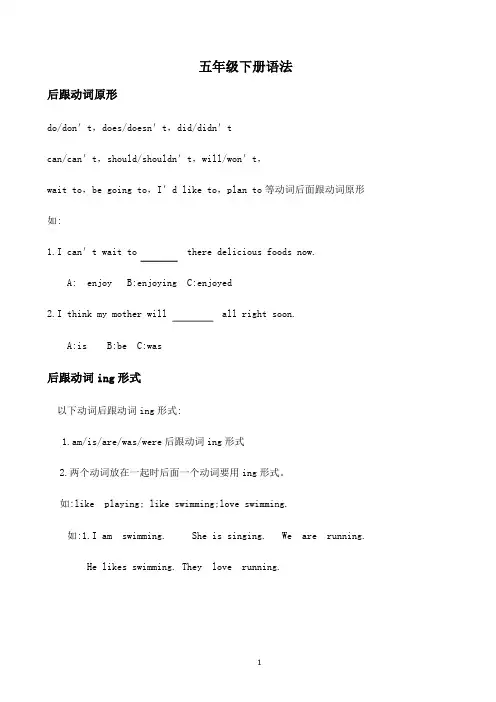
五年级下册语法后跟动词原形do/don't,does/doesn't,did/didn'tcan/can't,should/shouldn't,will/won't,wait to,be going to,I'd like to,plan to等动词后面跟动词原形如:1.I can't wait to there delicious foods now.A: enjoy B:enjoying C:enjoyed2.I think my mother will all right soon.A:is B:be C:was后跟动词ing形式以下动词后跟动词ing形式:1.am/is/are/was/were后跟动词ing形式2.两个动词放在一起时后面一个动词要用ing形式。
如:like playing; like swimming;love swimming.如:1.I am swimming. She is singing. We are running.He likes swimming. They love running.时态1.一般现在时句子中有频率动词sometimes/often/usually/always/seldom/every/never就用一般现在时。
如主语是第三人称单数(she/he/it/my father/my mother/Jiamin单独人名/the boy/the girl/the dog所有单数单词),动词加s或es;如主语不是第三人称单数(I//we/they/you/children/boys/girls所有复数单词)动词用原形。
如:She goes to school at 7:00 every. / My father often takesExercises at 6:30./We sometimes play football after school./They usually go to school at 7:20.2.现在进行时如句子中有单词: now/listen/look 就用现在进行时。
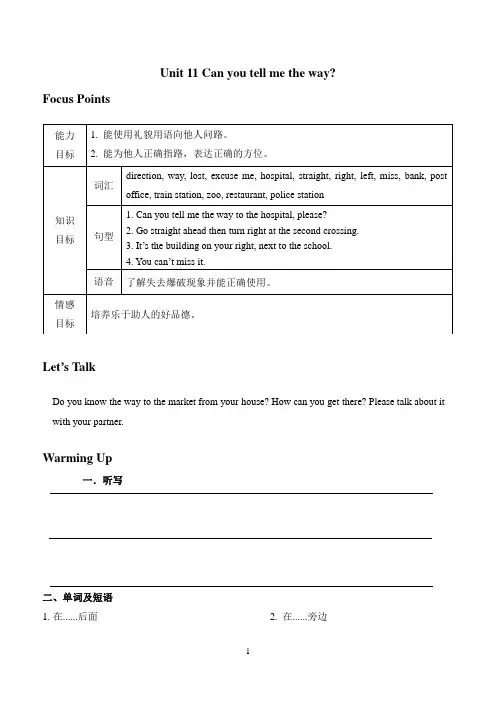
Unit 11 Can you tell me the way?Focus PointsLet’s TalkDo you know the way to the market from your house? How can you get there? Please talk about it with your partner.Warming Up一.听写二、单词及短语1.在......后面______________________2. 在......旁边_____________________3.靠近,紧邻_____________________4. 在...... 前面____________________5.在右边_________________________6. 在左边________________________7.在......附近______________________8. 方向__________________________9. 路_____________________________ 10. 迷路的_______________________ 11. 医院__________________________ 12. 笔直地_______________________ 13. 错过__________________________ 14. 银行_________________________ 15. 邮局__________________________ 16. 火车站_______________________ 17. 饭店__________________________ 18. 警察局______________________三.课文内容根据提示把句子补充完整。
Janet: Oh, dear! I think we’re________.Ben: Let’s go and ask the lady ________ there.Janet: Excuse me. ________ you tell me the ________ ________ the hospital, please?Lady: Of course. Let me see. Go ________ ahead then turn right ________ the second ________. Ben: Is the hospital on the left ________ on the right?Lady: It’s the building on your right, ________ to the school. You can’t ________ it.Janet and Ben: Thank you so much.Language Points【知识考点一】Can you tell me the way to the hospital, please? 请问你能告诉我去医院的路吗?the way to... 意为“到......的路”can意为“能,可以”,是情态动词,无人称和数的变化,后面接动词原形。
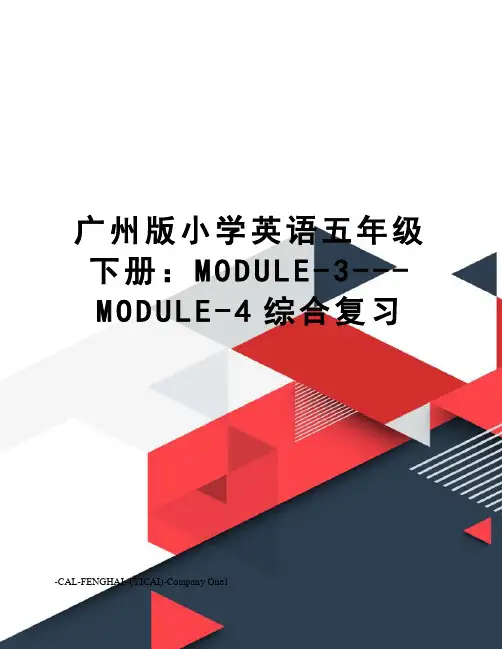
广州版小学英语五年级下册:M O D U L E-3---M O D U L E-4综合复习-CAL-FENGHAI.-(YICAI)-Company One1MODULE 3---MODULE 4综合复习Warming Up一.听写_________________________________________________________________________________ _________________________________________________________________________________ _________________________________________________________________________________ _________________________________________________________________________________ _____________________________________________________________________________________ __________________________________________________________________________________ __________________________________________________________________________________ _二.单词及短语【Module 3重点单词与短语】1.将会_________________________2. 没有东西______________________3.听起来_______________________4. 大门__________________________5.太妙了_______________________6. 没问题________________________7.比赛_________________________ 8. 中心__________________________9. 超市_________________________ 10. 我想做......____________________11. 邀请________________________ 12. 特别的_______________________ 13. 使惊奇______________________ 14. 开始_________________________ 15. 到达________________________ 16. 打电话_______________________【Module 4重点单词与短语】1.乘___________________________2. 火车__________________________3. 离开_________________________4. 激动的________________________5. 岛___________________________6. 出租汽车______________________7. 美国_________________________ 8. 美国的________________________9. 澳大利亚的___________________ 10. 旅行_________________________11. 激动的______________________ 12. 旅店_________________________ 13. 步行________________________ 14. 散步_________________________15. 围绕着______________________ 16. 湖___________________________17. 大街________________________ 18. 地铁_________________________三.课文内容【Module 3重点句型】1.你想要和我们一起去吗?________ you ________ to go with us2. 我们应该几点去?________ ________ ________ we go3. 我的堂兄和我计划去野餐。
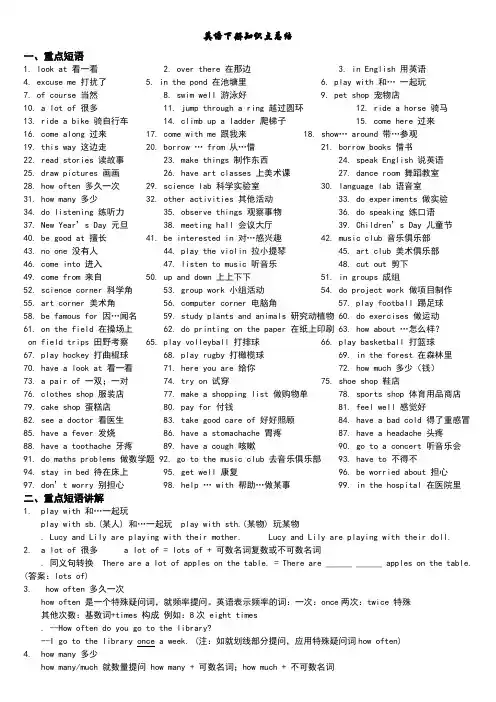
英语下册知识点总结一、重点短语1. look at 看一看2. over there 在那边3. in English 用英语4. excuse me 打扰了5. in the pond 在池塘里6. play with 和… 一起玩7. of course 当然8. swim well 游泳好9. pet shop 宠物店10. a lot of 很多11. jump through a ring 越过圆环12. ride a horse 骑马13. ride a bike 骑自行车14. climb up a ladder 爬梯子15. come here 过来16. come along 过来17. come with me 跟我来18. show… around 带…参观19. this way 这边走20. borrow … from 从…借21. borrow books 借书22. read stories 读故事23. make things 制作东西24. speak English 说英语25. draw pictures 画画26. have art classes 上美术课27. dance room 舞蹈教室28. how often 多久一次29. science lab 科学实验室30. language lab 语音室31. how many 多少32. other activities 其他活动33. do experiments 做实验34. do listening 练听力35. observe things 观察事物36. do speaking 练口语37. New Year’s Day 元旦38. meeting hall 会议大厅39. Children’s Day 儿童节40. be good at 擅长41. be interested in 对…感兴趣42. music club 音乐俱乐部43. no one 没有人44. play the violin 拉小提琴45. art club 美术俱乐部46. come into 进入47. listen to music 听音乐48. cut out 剪下49. come from 来自50. up and down 上上下下51. in groups 成组52. science corner 科学角53. group work 小组活动54. do project work 做项目制作55. art corner 美术角56. computer corner 电脑角57. play football 踢足球58. be famous for 因…闻名59. study plants and animals 研究动植物 60. do exercises 做运动61. on the field 在操场上62. do printing on the paper 在纸上印刷 63. how about …怎么样?on field trips 田野考察65. play volleyball 打排球66. play basketball 打篮球67. play hockey 打曲棍球68. play rugby 打橄榄球69. in the forest 在森林里70. have a look at 看一看71. here you are 给你72. how much 多少(钱)73. a pair of 一双;一对74. try on 试穿75. shoe shop 鞋店76. clothes shop 服装店77. make a shopping list 做购物单78. sports shop 体育用品商店79. cake shop 蛋糕店80. pay for 付钱81. feel well 感觉好82. see a doctor 看医生83. take good care of 好好照顾84. have a bad cold 得了重感冒85. have a fever 发烧86. have a stomachache 胃疼87. have a headache 头疼88. have a toothache 牙疼89. have a cough 咳嗽90. go to a concert 听音乐会91. do maths problems 做数学题 92. go to the music club 去音乐俱乐部93. have to 不得不94. stay in bed 待在床上95. get well 康复 96. be worried about 担心97. don’t worry 别担心98. help … with 帮助…做某事99. in the hospital 在医院里二、重点短语讲解1. play with 和…一起玩play with sb.(某人) 和…一起玩 play with sth.(某物) 玩某物. Lucy and Lily are playing with their mother. Lucy and Lily are playing with their doll.2. a lot of 很多 a lot of = lots of + 可数名词复数或不可数名词. 同义句转换 There are a lot of apples on the table. = There are ______ ______ apples on the table. (答案:lots of)3. how often 多久一次how often 是一个特殊疑问词,就频率提问。
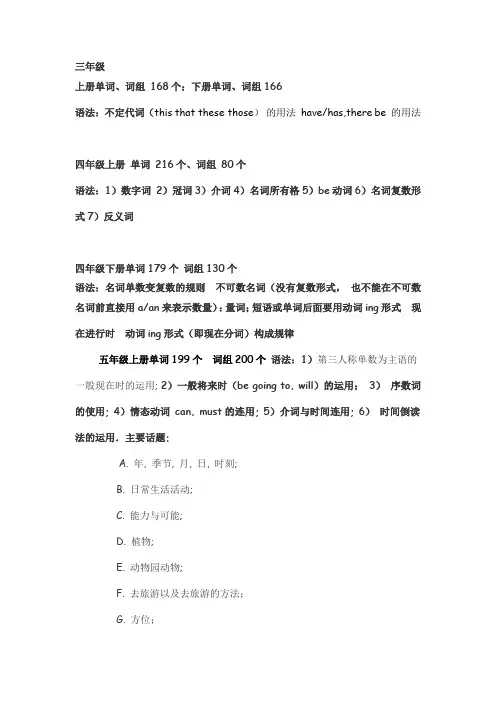
三年级上册单词、词组 168个;下册单词、词组166语法:不定代词(this that these those)的用法have/has,there be 的用法四年级上册单词 216个、词组 80个语法:1)数字词 2)冠词3)介词4)名词所有格5)be动词6)名词复数形式7)反义词四年级下册单词179个词组130个语法:名词单数变复数的规则不可数名词(没有复数形式,也不能在不可数名词前直接用a/an来表示数量):量词;短语或单词后面要用动词ing形式现在进行时动词ing形式(即现在分词)构成规律五年级上册单词199个词组200个语法:1)第三人称单数为主语的一般现在时的运用; 2)一般将来时(be going to, will)的运用; 3)序数词的使用; 4)情态动词 can, must的连用; 5)介词与时间连用; 6)时间倒读法的运用.主要话题:A. 年, 季节, 月, 日, 时刻;B. 日常生活活动;C. 能力与可能;D. 植物;E. 动物园动物;F. 去旅游以及去旅游的方法;G. 方位;H. 问路与应答;I. 规劝与应答五年级下册151个词组125个语法:1)掌握主语为第三人称单数一般现在时的各种句型2)学习和掌握should和shouldn’t的用法3)人称代词和物主代词的用语及正确使用4)形容词、副词的比较级的用法及构成4)I prefer…句型及待客用语的问答5)名词改为形容词的构词方法,如sun— sunny本册书有关于疾病、野生动物、食物等的名词及短语;有关于描述天气特征、人物状态、物体等的形容词还有动词和副词等。
(打电话、看病、询问、量度、用餐、天气)及相关的句型;六年级上册单词107个词组118个六年级下册单词140个词组130个语法:一般过去时;形容词的用法:形容词的比较级变化。
much +比较级;When 引导的时间状语从句--------用when连接前后两个完整的句子;There be句型;宾语从句;时间状语从句;年代的读法;选择疑问句;反意疑问句;连词(and,but,so)的用法;形容物体的形状、颜色、长相等;感叹句的学习;主语+ be 动词+ 形容词;形容词的比较级和最高级;时间表达;情态动词○1can/can’t + 动词原形could/couldn’t + 动词原形○2may/may not + 动词原形○3must/mustn’t + 动词原形(needn’t)Don’t + 动词原形禁止/不允许I hope/wish +句子(can/will/could/动词)我期望……(虚拟)。
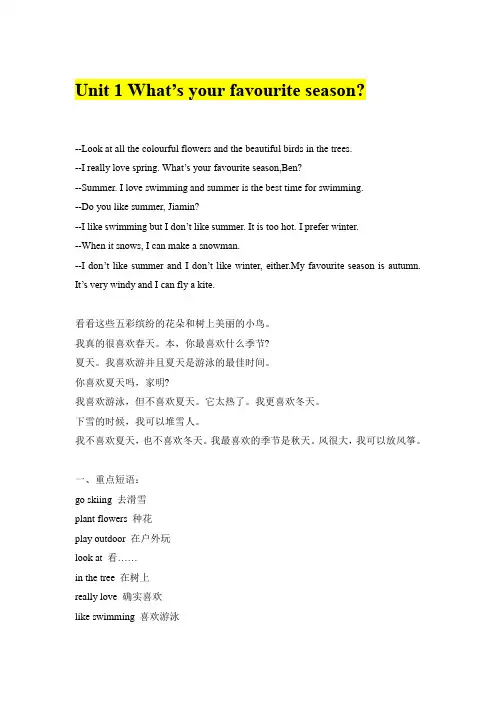
Unit 1 What’s your favourite season?--Look at all the colourful flowers and the beautiful birds in the trees.--I really love spring. What’s your favourite season,Ben?--Summer. I love swimming and summer is the best time for swimming.--Do you like summer, Jiamin?--I like swimming but I don’t like summer. It is too hot. I prefer winter.--When it snows, I can make a snowman.--I don’t like summer and I don’t like winter, either.My favourite season is autumn. It’s very windy and I can fly a kite.看看这些五彩缤纷的花朵和树上美丽的小鸟。
我真的很喜欢春天。
本,你最喜欢什么季节?夏天。
我喜欢游并且夏天是游泳的最佳时间。
你喜欢夏天吗,家明?我喜欢游泳,但不喜欢夏天。
它太热了。
我更喜欢冬天。
下雪的时候,我可以堆雪人。
我不喜欢夏天,也不喜欢冬天。
我最喜欢的季节是秋天。
风很大,我可以放风筝。
一、重点短语:go skiing 去滑雪plant flowers 种花play outdoor 在户外玩look at 看……in the tree 在树上really love 确实喜欢like swimming 喜欢游泳go skiing 去滑雪make a snowman 堆雪人fly a kite 放风筝二、重点句型:1. --What’s your favourite season?--My favourite season is summer.2. –What season do you like best?--I like spring best.三、重点分析:1. in the tree 和on the tree都可以表示“在树上”;in the tree表示外来的东西在树上;on the tree表示树本身的东西。
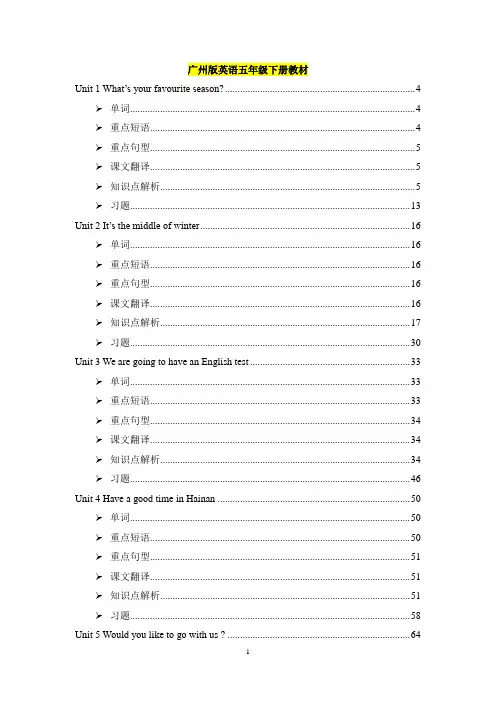
广州版英语五年级下册教材Unit 1 What’s your favourite season? (4)➢单词 (4)➢重点短语 (4)➢重点句型 (5)➢课文翻译 (5)➢知识点解析 (5)➢习题 (13)Unit 2 It’s the middle of winter (16)➢单词 (16)➢重点短语 (16)➢重点句型 (16)➢课文翻译 (16)➢知识点解析 (17)➢习题 (30)Unit 3 We are going to have an English test (33)➢单词 (33)➢重点短语 (33)➢重点句型 (34)➢课文翻译 (34)➢知识点解析 (34)➢习题 (46)Unit 4 Have a good time in Hainan (50)➢单词 (50)➢重点短语 (50)➢重点句型 (51)➢课文翻译 (51)➢知识点解析 (51)➢习题 (58)Unit 5 Would you like to go with us ? (64)➢重点短语 (65)➢重点句型 (65)➢课文翻译 (65)➢知识点解析 (66)➢习题 (70)Unit 6 See you at the party (73)➢单词 (73)➢重点短语 (74)➢重点句型 (74)➢课文翻译 (74)➢知识点解析 (75)➢习题 (82)Unit 7 We will go by train (85)➢单词 (85)➢重点短语 (85)➢重点句型 (86)➢课文翻译 (86)➢知识点解析 (86)➢习题 (91)Unit 8 Ben’s first trip to Beijing (95)➢单词 (95)➢重点短语 (95)➢重点句型 (96)➢课文翻译 (96)➢知识点解析 (96)➢习题 (103)Unit 9 Be careful (108)➢单词 (108)➢重点句型 (109)➢课文翻译 (109)➢知识点解析 (110)➢习题 (114)Unit 10 How to stay safe (117)➢单词 (117)➢重点短语 (117)➢重点句型 (118)➢课文翻译 (118)➢知识点解析 (119)➢习题 (123)Unit 11 Can you tell me the way? (126)➢单词 (126)➢重点短语 (127)➢重点句型 (127)➢课文翻译 (127)➢知识点解析 (128)➢习题 (134)Unit 12 I know a short cut (138)➢单词 (138)➢重点短语 (139)➢重点句型 (139)➢课文翻译 (139)➢知识点解析 (140)➢习题 (143)Unit 1 What’s your favourite seas on? ➢单词词汇音标中文c o l our ful [ˈkʌləfl] 多彩的*pr e f er[prɪˈfɜ:(r)] 选择;宁愿要w i nt er[ˈwɪntə(r)] 冬天ei th er[ˈaɪðə(r)] 也au t u mn [ˈɔ:təm] 秋天sk i[sk i:] 滑雪pl a nt [plɑ:nt] 植物c a mp [kæmp] 野营go camping 去野营➢重点短语go skiing 去滑雪really love 确实喜欢plant flowers 种花like swimming 喜欢游泳play outdoors 在户外玩fly a kite / fly kites放风筝look at 看……make a snowman 堆雪人in the tree 在树上➢重点句型1. --What’s your favourite season?--My favourite season is summer.2. –Which season do you like best?--I like spring best.➢课文翻译--Look at all the colourful flowers and the beautiful birds in the trees.--I really love spring. What’s your favourite season,Ben?--Summer. I love swimming and summer is the best time for swimming.--Do you like summer, Jiamin?--I like swimming but I do n’t like summer. It is too hot. I prefer winter.--When it snows, I can make a snowman.--I don’t like summer and I don’t like winter, either.My favourite season is autumn. It’s very windy and I can fly a kite.看看这些五彩缤纷的花朵和树上美丽的小鸟。
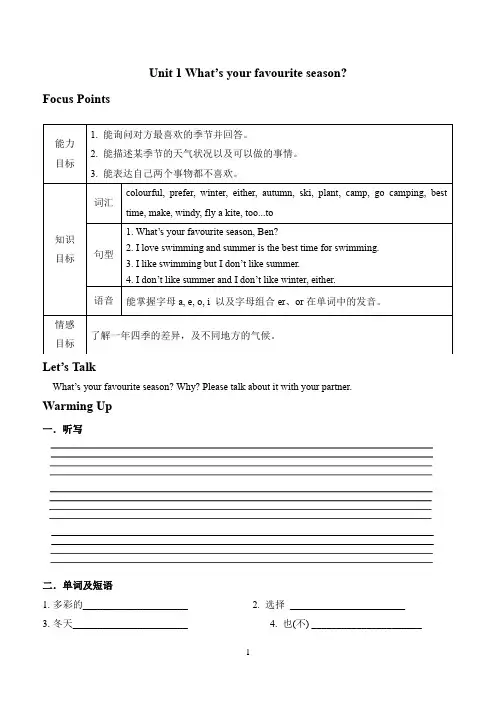
Unit 1 What’s your favourite season?Focus PointsLet’s TalkWhat’s your favourite season? Why? Please talk about it with your partner.Warming Up一.听写二.单词及短语1.多彩的_____________________2. 选择_______________________3.冬天_______________________4. 也(不) ______________________5.秋天_______________________6. 滑雪________________________7.种植_______________________8. 去野营______________________9. 最好的时间_________________10. 更喜欢_____________________ 11. 堆雪人____________________ 12. 放风筝_____________________三.课文内容根据提示把句子补充完整。
Xiaoling: Look at all the _______ _______(多彩的花)and the beautiful birds _____ the trees. I really love __________.(春天)_______ ________ ________________,Ben? (你最喜欢哪个季节)Ben: Summer. I love __________(游泳) and _________(夏天)is the best time _________swimming. _________ you like summer, Jiamin?Jiamin: I like swimming ________I don’t like summer. It is too hot. I _______________.(更喜欢冬天)__________(当......)it snows, I can _________________ _________(堆雪人).Janet: I _______like summer and I don’t like winter,_______.(也) My favourite season is autumn. It’s very windy and I can ________ _________ ________.Language Points【知识考点一】in the tree 和on the tree都可以表示“在树上”;in the tree表示外来的东西在树上;on the tree表示树本身的东西。
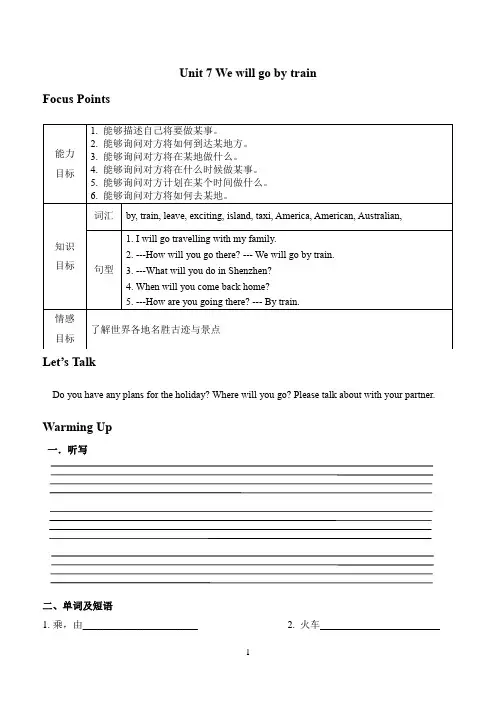
Unit 7 We will go by trainFocus PointsLet’s TalkDo you have any plans for the holiday? Where will you go? Please talk about with your partner. Warming Up一.听写二、单词及短语1.乘,由_______________________2. 火车________________________3.离开_________________________4. 激动的______________________5.岛___________________________6. 出租汽车____________________7.美国_________________________8. 美国的______________________9. 澳大利亚的___________________10. 计划_______________________ 11. 步行________________________ 12. 在......期间__________________ 13. 喂养________________________三.课文内容根据提示把句子补充完整。
Janet: Do you have any ________ for the holiday?Ben:Yes. I ________ _________ _________with my family. We ________ ________ ________ Shenzhen.Xiaoling: How will you go there?Ben: We will _________ _________ _________. (将会坐火车)We will leave__________ _________ _________.(10月2日)I can’t wait.Janet: It’s very _________.(这真令人感到兴奋)What will you do in Shenzhen?Ben:Well...we ________ ________ _________ _________Window of the World, of course. And I want to go to Happy Valley, too.Janet: _________ _________ _________ come back home?(打算什么时候回家?)Ben: We will come back home on October 4th .Language Points【知识考点一】I will go travelling with my family. 我将和我的家人去旅行。

Unit 11 Can you tell me the way?Focus PointsLet’s TalkDo you know the way to the market from your house? How can you get there? Please talk about it with your partner.Warming Up一.听写二、单词及短语1.在......后面______________________2. 在......旁边_____________________3.靠近,紧邻_____________________4. 在...... 前面____________________5.在右边_________________________6. 在左边________________________7.在......附近______________________8. 方向__________________________9. 路_____________________________ 10. 迷路的_______________________ 11. 医院__________________________ 12. 笔直地_______________________ 13. 错过__________________________ 14. 银行_________________________ 15. 邮局__________________________ 16. 火车站_______________________ 17. 饭店__________________________ 18. 警察局______________________三.课文内容根据提示把句子补充完整。
Janet: Oh, dear! I think we’re________.Ben: Let’s go and ask the lady ________ there.Janet: Excuse me. ________ you tell me the ________ ________ the hospital, please?Lady: Of course. Let me see. Go ________ ahead then turn right ________ the second ________. Ben: Is the hospital on the left ________ on the right?Lady: It’s the building on your right, ________ to the school. You can’t ________ it.Janet and Ben: Thank you so much.Language Points【知识考点一】Can you tell me the way to the hospital, please? 请问你能告诉我去医院的路吗?the way to... 意为“到......的路”can意为“能,可以”,是情态动词,无人称和数的变化,后面接动词原形。
五年级英语下册知识点五年级英语下册是指小学五年级下学期的英语教材内容,主要涉及日常生活、学校生活、家庭、食物、动物、天气、节日等方面的知识。
下面是五年级英语下册的相关知识点参考内容。
1. 日常生活1.1 表达日常活动:brush one's teeth, wash one's face, get dressed, have breakfast, go to school, go home, do homework, go to bed等1.2 表示一天的时间顺序:morning, afternoon, evening, night等1.3 问答句式:What time do you...? What's your day like?2. 学校生活2.1 学习科目:Chinese, English, math, music, art, P.E.等2.2 学习用具:pen, pencil, eraser, ruler, notebook等2.3 学校设施:classroom, library, playground, computer room等2.4 学校活动:sing songs, play games, draw pictures, read books 等3. 家庭3.1 家庭成员:father, mother, sister, brother, grandparents等3.2 家庭活动:have dinner together, watch TV, play games等3.3 家庭用品:table, chair, bed, sofa, fridge, TV等4. 食物4.1 水果:apple, banana, orange, grape, mango等4.2 蔬菜:carrot, tomato, cabbage, potato, onion等4.3 主食:rice, noodles, bread, porridge等4.4 饮料:milk, water, juice, tea等4.5 能力:can/can't+动词原形:I can swim. I can't cook.5. 动物5.1 野生动物:elephant, tiger, lion, giraffe, zebra等5.2 宠物动物:cat, dog, rabbit, goldfish等5.3 鸟类:bird, duck, pigeon, ostrich等5.4 动物特征和习性:big, small, fast, slow, eat grass, swim, fly等6. 天气6.1 天气状况:sunny, cloudy, rainy, snowy, windy等6.2 询问天气:What's the weather like today?7. 节日7.1 重要节日:New Year’s Day, Spring Festival, Mid-Autumn Festival, Christmas等7.2 节日习俗:eat dumplings, watch fireworks, give gifts等此外,五年级英语下册还会涉及一些简单的时态和语法知识,如一般现在时、一般过去时、there be句型、连词and、but、because等的使用等。
小学英语五年级下册复习资料Unit 1 Good Helpers重点词汇:clean the room打扫房间wash the socks 洗袜子make the bed整理床铺do the dishes 洗碗cook the dinner 做晚饭water the plants 给植物浇水put away the clothes 收拾衣服take out the rubbish倒垃圾相关词汇:often 经常;常常sometimes 有时parents 父母helper 帮手kids 孩子们Mother’s Day 母亲节at once 马上重点句型:1.---Do you help your parents at home? 你在家会帮助父母吗?---Yes, I do. / No, I don’t.是的,我会。
/ 不,我不会。
2.---What do you do at home? 你在家会做些什么?---I often do the dishes. 我经常洗碗。
3.---What can you do for your parents? 你能为父母做些什么?---I can cook the dinner. 我会做晚饭。
4.---Does Max often help his parents? 麦克斯会经常帮助他的父母吗?---Yes, he does. / No, he doesn’t. 是的,他会。
/ 不,他不会。
5.---Let’s get to work at once. 我们马上行动吧。
相关句型:1.I often clean the rooms. 我经常打扫房间。
2.He often makes the bed. 他经常整理床铺。
3.Sometimes I wash my socks. 有时我洗自己的袜子。
4.I can water the plants. 我会给植物浇水。
5.Lu Hua can cook the dinner. 卢华会做晚饭。
最新(⼀年级起点)新版外研社⼩学英语五年级下册M5-M10知识点汇总最新(⼀年级起点)新版外研社⼩学英语五年级下册M5-M10知识点汇总第⼀模块词汇:1、drive(过去式drove)驾驶2、flute笛⼦3、player演奏者4、office办公室5、factory(复数)factories6、shop商店7、hospital医院8、fish 捕鱼,钓鱼(动词)9、farm农场职业名称拓展:1、farmer农民2、postman邮递员3、doctor医⽣4、nurse护⼠5、firefighter / fireman消防员6、writer作家7、driver司机8、policeman警察短语:1、in the picture在照⽚上2、drive a bus驾驶公共汽车3、Chinese music中式⾳乐4、play the flute吹笛⼦5、teach English教英语6、work in an office在办公室⼯作7、work in a factory在⼯⼚⼯作8、work in a shop在商店⼯作9、work in a hospital在医院⼯作10. work on a farm 在农场⼯作11. a flute / an erhu player ⼀位笛⼦(⼆胡)演奏者12、work at a school 在学校⼯作13、work at a bank在银⾏⼯作语法要点:本模块我们主要学习⽤⼀般现在时形式和⼀般过去时形式谈论某⼈的职业和具体⼯作.要关注时间状语before/now,区分时态.询问职业及职业中的细分类时要⽤特殊疑问词What .例:What did your father do ?What does your father do ?询问⼯作场所要⽤特殊疑问词Where例句:Where did your father work?Where does your father work ?主要句型:She was a driver before. 以前她是个司机.What did she do before ?What did she drive? She drove a bus. 她驾驶什么车?她驾驶公交车.He was a flute player before.以前他是个笛⼦演奏者.What music did he play?他演奏什么⾳乐?He played Chinese music他演奏中国⾳乐.He worked in an office.他在办公室⼯作.Where did he work ?第⼆模块词汇:1、email电⼦邮件2、sausage⾹肠3、sandwich(复数sandwiches)三明治4、delicious美味的5、English英式的6、Chinese中式的7、traditional传统的8、fish and chips炸鱼加炸薯条9、dish ⾷品,菜肴10、chicken 鸡⾁11、vegetable 12、special特别的13、family(复数families)家庭有关⾷物的名词:bread ⾯包,meat ⾁,fish鱼⾁,egg(复数eggs)鸡蛋,vegetable(复数vegetables )蔬菜(注意:指不同种类的蔬菜时,是可数名词.类似fruit,),sausage(复数sausages) ⾹肠,sandwich(复数sandwiches)三明治,chicken鸡⾁(不可数),potato(复数potatoes)⼟⾖,tomato(复数tomatoes) 西红柿,hamburger(复数hamburgers)汉堡包短语:1、have breakfast/lunch/dinner/supper吃早餐/午餐/晚餐2、have……for breakfast/lunch/dinner/supper 早餐/午餐/晚餐吃什么3、a traditional English dish 传统的英式菜肴4、about English food关于英国的⾷物5、……be good for sb ……对谁有好处(如:vegetables are good for you)语法要点:1、谈论时间整点钟----o’clock 半点钟-----half past_____2、谈论三餐关注⾷品名称注意时态是“经常吃”(usually have.....)还是“某餐吃过…”(had ....for breakfast/lunch/dinner).主要句型:提问吃了什么,⽤what.What did she have for breakfast?她早晨吃的什么?She had eggs and sausages.她吃的鸡蛋和⾹肠.What did she have for dinner?她晚餐吃的什么?She had fish and chips.她吃的鱼和薯条提问吃饭的时间,⽤whenLunch is usually at half past twelve.午饭经常在⼗⼆点半.When is lunch usually at ?When does Sam have breakfast?第三模块词汇:1、DVD (复数DVDs)数字化视频光盘2、librarian图书管理员,图书馆馆长3、show 给(某⼈)看4、borrow借⼊5、library(复数libraries)图书馆7、shelf(复数shelves)书架8、favourite最喜欢的事或物.在此处作名词短语:1、a present for ……给……的礼物2、take a look 看⼀看3、在电脑上查询4、at the library 在图书馆5、show sth to sb 把……给谁看6、library card 借书卡7、give sth back 把……还回来(=return) (如:give books back 把书还回来)8、in two weeks 在两周内9、in the library 在图书馆⾥辨析:at the library vs. in the libraryat the library通常指在图书馆那个场所的位置in the library 是指在图书馆⾥.通常与在图书馆⾥做的事相关联.(如:You can do lots of things in the library.)10、school library 学校图书馆11、make rules 制定规则语法要点:1、本模块主要使⽤⼈称代词的主格和have got/has got的使⽤主格包括:I\you\he\she\it\we\they它们是动作的发出者,在句⼦中作主语的使⽤:⽆⼈称变化,后接动词原形2、情态动词can/can’t主要句型:Have you got …?你有...?Yes,we have.是的,我们有.No,we haven’t.不,我没有.抱歉,我们没有…Sorry,we haven’t got the …But we’ve got the books.但是我们没有书.You can use the 你可以⽤电脑.……is our favourite. ……是我们特别喜爱的.(favourite 在此处作名词,如:Harry Potter is our favourite )Can I have……,please? 请给我……好吗?例句:Can I have some sweets,please ?You can ……You can’t……第四模块词汇:1、fine(⾝体)很好2、send(过去式sent)寄,发送3、get收到4、American美国的,美国⼈的5、read (过去式read )阅读6、interesting 令⼈感兴趣的,有趣的7、season季节8、snow 雪9、chocolate巧克⼒(注意:作可数名词时是有巧克⼒糖块的意思,复数是chocolates;但如果作为 1.事物的名字时 2.作巧克⼒饮料时 3.形容颜⾊即深褐⾊、巧克⼒⾊时.是不可数的名词)10、spring / summer / autumn / winter春夏秋冬11、shorts短裤12、leaf(复数leaves) 树叶13、gloves⼿套(a pair of gloves ) 14、temperature温度15、high/low⾼/低短语:1、live in住在(后跟国家)2、a maths game数学游戏(注意:maths作为⼀门科⽬时要⼤写)4、send sb. sth.=send sth. to sb.寄某物给某⼈5、on the tree在树上(长的)/ in the tree(外来)*in the tree 和on the tree 的区别1) in the tree ⼀般指外来的东西在树上,不是树本⾝所有,如⼈、动物等在树上.例如:There is a bird in the tree. 树上有⼀只鸟.Jack is in the tree. He can’t get down. 杰克在树上,他下不来了.2)on the tree 通常指树本⾝长出的东西,如枝、叶、花、果等.There are many apples on the tree. 树上有许多苹果.She’s picking oranges on that tree. 她在摘那棵树上的橘⼦.6、in the river 在河⾥7、go swimming去游泳8、go skiing 去滑雪9、fall from 从……上落下10、play with the snow玩雪11、fall from the trees从树上飘落语法要点:1、巩固⼀般过去时的⼀般疑问句及其肯否定回答2、谈论四季的特征温度(温度⾼低⽤high/low)、穿着、⾃然状况、喜欢做的事情)3、本模块主要区分、掌握、使⽤⼈称代词的主格和宾格形式主格是动作的发出者,在句⼦中作主语.宾格是动作的承受者,在句⼦中接在动词或介词后.主要句型:How are you?你好.Fine,thanks.好的,谢谢.I sent you a Maths game.我送给你⼀个数学游戏.Did you get it ?你收到了吗?I sent you English books.我送给你英语书Did you read them?你读了吗?I’ve got some …我有了… I read/…last week上周我读了...My favourite season is spring.我最喜欢的季节是春天.The leaves fall from the trees . I can play with them.第五模块词汇:1、How much ……多少钱2、light 轻的3、sales assistant 售货员、营业员4、carry提,抱,扛,背,搬5、pound 英镑6、back背,背部7、over 在……的上⽅,在……的上⾯8、shoulder肩膀9、broken损坏10、cheap便宜的11、wheel轮⼦12、back背部互为反义的单词heavy / light重/轻big / small ⼤/ ⼩easy/hard易/ 难long / short长/ 短短语:1、take…to…把某物带到某地2、buy sb sth给某⼈买什么3、at the shop (注意与in the shop 的区别:我们说在某⼀点的时候,我们使⽤at.当我们说在某⼀点范围⾥的时候,我们⽤in.)4、be easy/hard for sb to do sth对某⼈⽽⾔很容易/困难5、carry ……on one’s back把……背在背后6、carry……over one’s shoulder单肩背……7、carry ……with my hand(s)⽤单(双)⼿提……8、can’t carry it at all根本不能拿9、eat with one’s mouth ⽤……的嘴巴吃/ see with one’s eyes ⽤眼睛看/ hear withone’s ears ⽤⽿朵听/ walk with one’s legs⽤腿⾛语法要点:表形状,颜⾊,重量,新旧的形容词含有情态动词can的⼀般疑问句.名词性物主代词的⽤法主要句型:Your bag is broken.你的包破了.它很⼤.This black bag is nice.这只⿊包很好It’s big.It’s very heavy.它很重.Look at this green one.看这个绿⾊的.它很轻.It’s light.We’ll take it . 我们将买下它.Can you carry my bag on your back ? 你能把我的包背在你⾝上吗?Mine is pink.我的是粉红⾊的.名词性物主代词:单数形式:mine(我的xx),yours(你的xx),his /hers /its(他的xx、她的xx、它的xx).复数形式:ours(我们的xx),yours(你们的xx),theirs(他们的xx).名词性物主代词=形容词性物主代词+名词例:Mine is pink = My bag is pink.名词性物主代词既可以作主语⼜可以作宾语.⼝诀:有名(名词)则形(形容词性物主代词),⽆名(名词)则名(名词性物主代词)Let’s do sth =let us do sth.第六模块词汇:1、build建造2、place地⽅3、circle圆,圆形4、thousand(数字)千5、answer 答案6、hope希望7、so 如此8、get (过去式got) 到达(某地)9、hour ⼩时6、amazing令⼈吃惊的10、take 搭乘,乘坐11、short 短暂的,短期的12、helicopter直升飞机13、Stonehenge巨⽯阵(不加the) 14、top顶部15、interesting有趣的16、clever聪明的4、solve解决7、think(过)thought认为12、picnic野餐14、camera照相机15、rule规则16、same相同的18、joke玩笑19、mystery谜团短语:1、lots of=a lot of许多2、in a circle排成圆形3、on top of在…的顶部4、find the answer找到答案5、get there到达那⾥6、have a picnic野餐7、take a bike ride 骑⾃⾏车(=ride a bike)8、take a bus ride 乘公交车9、a very big surprise ⼀个很⼤的惊喜10、take a short helicopter ride乘短时间的直升飞机11、from the sky 从天上看12、over Stonehenge 在巨⽯阵上⽅13、take nice photos 照好看的照⽚(=take pictures)14、all around the world全世界15、sing songs 唱歌16、clap along ⼀起拍⼿17、follow rules遵守规则18、play games 做游戏20、it’s the same all around the world.全世界都⼀样.语法要点:1、讲述计划或打算:⼀般将来时will/be going to后接动词原形2、讲述经历:⼀般过去时动词⽤过去时形式3、thousand 的⽤法4、特殊疑问词How old,why,how的⽤法.主要句型:特殊疑问句构成:特殊疑问词+be (am,is ,are,was ,were ) / 助动词(will,be going to ,do ,does,did,have,has,had )/情态动词(can,should,等)+主语+动词原形+其他+?How old 意思:年齿,⽤来提问年龄或建筑物距今有多么久远.如:How old are you ? I’m 6 years old.How old is the Great Wall ? it’s about five thousand years old.注意:在表⽰确切的数字时,不能使⽤百、千、百万、⼗亿的复数形式;What 意思:什么,⽤来询问职业或事物What will we see there?在那⼉你会看见什么?We’ll see lots of….我们会看见许多…Why 意思:为什么,⽤来提问原因Why did people build it ?How 意思:怎样,⽤来提问健康状况或做事的⽅式How will we get there?我们怎么到哪⼉?By car.乘车.I hope so 我希望如此It will take three hours.它将⽤三个⼩时.It was amazing.它很让⼈惊讶.There’s a big surprise waiting for me. ( there be 句型是⼀种倒装结构.主语是be后⾯的名词词组.此句中主语是 a big surprise ,谓语动词是动词短语wait for 的现在进⾏时is waiting for,宾语是me)第七模块词汇:1、evening 傍晚,晚上2、actor 演员(男)3、busy忙的,忙碌的4、quarter ⼀刻钟互为反义的单词:late<---->early短语:1、from…to…从…到… 2、take sb/sth to school 带……去学校3、be home到家语法要点:1、祈使句:以动词原形引导句⼦,省略主语you,表⽰命令等2、⼀般现在时:经常做的事注意⼀般现在时的主语的三单形式,如my mum,David’s mum等,谓语动词形式发⽣变化.3、⼀般将来时:将要做的事will / be going to4、现在进⾏时:正在做的事主要句型:what time 意思:什么时间,⽤来提问时间.What time will you be home?Don’t worry.不要着急.祈使句.Here he is .他到了.(倒装结构.主语是he)My mum/ David’s mum get s up at 7 o’clock. (主语三单)I will be home at seven o’clock.我将于七点到家.第⼋模块词汇:1、Chinese 中国⼈的2、drew (draw的过去式)绘画,画3、piece张、⽚、块4、painted (paint 的过去式)给……涂颜料5、scissors (常复)剪⼑6、stick棍、棒7、tied (tie的过去式)扎上,系上8、string 线,细绳9、visit拜访10、cousin堂/表兄弟姐妹11、of course当然4、paper纸5、scissors剪⼑8、present礼物9、chopsticks筷⼦10、windy多风的11、help帮助12、dragon龙13、paint涂⾊短语:1、in New York在纽约2、What/How about…?怎么样3、good idea好主意4、make a kite做⼀个风筝5、be windy有风的6、a Chinese dragon ⼀只中国龙7、thank you for your help.谢谢你的帮助8、be a great present成为⼀份珍贵的礼物9、cut the paper 剪纸10、draw a dragon on a piece of yellow paper在⼀张黄纸上画⼀条龙11、cut the paper with scissors⽤剪⼑剪纸12、put ……on……把…放在…上13、tie strings to ……14、fly my kite放我的风筝15、above the clouds 云层之上语法要点:1、⼀般将来时will / be going to 的使⽤2、⼀般过去时讲述制作风筝的过程主要句型:what about 意思是:……怎么样,⽤来询问对⽅的意见、看法.结构:What about + 名词(单、复数、不可数名词或代词)what about chopsticks ?I think ……我想,我认为I think he has got some chopsticks.Will you help me?你会帮助我吗?Of course,I will.当然,我会.我的名字是...My/ His/ Her / Your name is …第九模块词汇:1、theatre剧院2、man(复数men)男⼈3、woman(复数women)⼥⼈4、tell (过去式told) ⼝述,讲5、joke 笑话6、funny 滑稽的,可笑的7、show演出8、put (过去式put) 放置9、history历史,历史学10、subject 学科,科⽬11、laugh(过去式laughed)笑12、wear(过去式wore)穿13、actor演员14、restaurant餐馆15、trip旅⾏16、read (过去式read [red])读17、question (复数questions)问题18、postman 邮递员19、England 英国20、Spain 西班⽛21、Australia澳⼤利亚22、Disneyland 迪⼠尼乐园去⼉童剧场短语:1、go to a children’s theatre2、tell lots of jokes讲很多笑话3、a lot很多4、after the show 演出结束后5、go to a restaurant去餐馆6、be ready for 做好…的准备7、a trip to the US去美国的旅⾏8、buy sth.for sb.给某⼈买某物9、at all 根本10、a book about Chinese history⼀本关于中国历史的书11、a letter from ⼀封来⾃……的信12、a letter to 给……的⼀封信语法要点:1、⼀般过去时讲述经历重点:动词不规则变化2、⼀般将来时介绍计划重点:句中动词⽤原形注意特殊结构be____表⽰:出于某种状态3、现在进⾏时正在做某事重点:be+V-ing4、英⽂书信的格式(信头,写信⼈的地址和写信⽇期,写在或打在第⼀⾯信纸的右上⾓,先写地址再写⽇期,地址的写法是从⼩到⼤,先写门牌号、路号,再写区名、市名、省名,最后写国名.主要句型:The men wore women’s clothes.这个男⼈穿着⼥⼈的⾐服.The actor told lots of jokes.这位演员讲了许多笑话..We laughed a lot.我们开怀⼤笑.History is my favourite subject.That will be fun!那将会很有趣.see you soon 希望不久能见到你第⼗模块词汇:1、ticket票2、passport护照3、leave(过去式left )离开,动⾝4、July 七⽉5、August ⼋⽉6、meet (过去式met ) 遇见7、classmate 同班同学8、airport机场9、Brighton 布赖顿码头(英国南部海岸避暑胜地)10、Mount Tai 泰⼭11、beach海滩12、train⽕车13、ship船toothbrush(复数)toothbrushes⽛刷4、building建筑物6、短语:1、put ……in your bag 把……放进你的包⾥2、take a plane乘飞机3、on the beach在海滩上4、in the photo(picture) 在照⽚上5、in July/August 在七/⼋⽉6、make a new friend/make friends交新朋友7、climb a mountain / climb mountains爬⼭8、by train / by plane / ship 乘⽕车/飞机/ 轮船9、a different trip ⼀次与众不同的旅⾏语法要点:同九模块主要句型:What did you put in your bag?你包⾥放了什么?My …and my ….我的...和我的...I played on the beach.我是在沙滩上玩的.Where will you go tomorrow?明天你会去哪⼉?我会去...I’ll go to …。
广州版小学英语五年级下册:U n i t-5-W o u l d-y o u-l i k e-t o-g o-w i t h-u s-CAL-FENGHAI.-(YICAI)-Company One1Unit 5 Would you like to go with us?Focus PointsLet’s TalkIf tomorrow is your birthday, you are going to have a party. And you want to invite your classmates and your friends, how can you invite themWarming Up一.听写二.单词及短语1.邀请_______________________2. 将会___________________________3.没有东西___________________4. 听起来不错 ____________________5.大门_______________________6. 没有问题_______________________7.比赛_______________________8. 中心__________________________9. 超市_______________________ 10. 计划去做______________________11. 去野餐____________________ 12. 在学校门口____________________13. 举行一个派对 _____________ 14. 看电影_______________________15. 观看一场足球赛 ___________三.课文内容根据提示把句子补充完整。
Janet: Hey, guys. What are you doing this Saturday?Ben: Nothing. Why?Janet: My cousin and I plan to go ________ ________ _________. Would you________ ________ _________ with usJiamin: A picnicThat ________(听起来)great!Ben: What time ________ we go?Janet: Let’s meet ________ the school gate ________9:00 a.m.We can all go to the partytogether.Ben: Cool. The picnic is this Saturday, August 14th , right?Jiamin: Oh dear. I’m sorry but I am going to my grandma’s birthday party that day. Janet: No problem. Maybe ________ ________(下次).Language Points【知识考点一】Would you like to go with us 你(们)想要和我们一起去吗句型结构:Would you like to +动词原形+其他?该句型用于询问对方是否愿意做某事。
Unit 1 What’s your favourite season?Focus PointsLet’s TalkWhat’s your favourite season? Why? Please talk about it with your partner.Warming Up一.听写二.单词及短语1.多彩的_____________________2. 选择_______________________3.冬天_______________________4. 也(不) ______________________5.秋天_______________________6. 滑雪________________________7.种植_______________________8. 去野营______________________9. 最好的时间_________________10. 更喜欢_____________________ 11. 堆雪人____________________ 12. 放风筝_____________________三.课文内容根据提示把句子补充完整。
Xiaoling: Look at all the _______ _______(多彩的花)and the beautiful birds _____ the trees. I really love __________.(春天)_______ ________ ________________,Ben? (你最喜欢哪个季节)Ben: Summer. I love __________(游泳) and _________(夏天)is the best time _________swimming. _________ you like summer, Jiamin?Jiamin: I like swimming ________I don’t like summer. It is too hot. I _______________.(更喜欢冬天)__________(当......)it snows, I can _________________ _________(堆雪人).Janet: I _______like summer and I don’t like winter,_______.(也) My favourite season is autumn. It’s very windy and I can ________ _________ ________.Language Points【知识考点一】in the tree 和on the tree都可以表示“在树上”;in the tree表示外来的东西在树上;on the tree表示树本身的东西。
PEP小学英语五年级下册第一单元知识点归纳一、主要单词:drningexerises晨练,做早操eatbreafast吃早饭haveEnglishlass上英语plasprts进行体育活动eatdinner吃晚饭eatlunh吃午饭libuntains 爬山gshpping购物,买东西plathepian弹钢琴visitgrandparents看望(外)祖父母ghiing去远足二、主要句子:hendueatdinner?你什么时候吃晚饭?Ieatdinnerat7:00intheevening我晚上七点吃晚饭。
hendugetup?你什么时候起床?Iusuallgetupat12:00atnn我通常在中午12点起床。
hatdudntheeeend?你在周末干什么?UsuallIathTVandgshpping我通常看电视和购物。
SetiesIvisitgrandparents有时候我去看望我的外祖父母。
Iftenplaftball我经常踢足球。
SetiesIghiing有时候我去远足。
三、同义词:eatbreafast—havebreafasteatlunh—havelunheatdinner—havedinnerplasprts—dsprts复数形式:pliean—plieenpliean—plieen现在分词:tell—telling三单:sa—sas同义句:hatdud?或hatareu?对应的第三人称单数形式:hatdeshe/shed?或hatishe/she?(他/她是做什么工作的?)四、表示频度的副词:alas总是,一直usuall通常,常常ften经常seties有时候never从不频率由高到低排列:alas〉usuall〉seties〉never五、以复数形式出现的词组:visitgrandparents,planttrees六、介词后跟表示时间的词语时,表示在某年、某月、某个季节,某个时候(在上午,在下午,在晚上)用in;表示在某一天,在星期几用n,在具体的几点几分用at 例如:用介词in:inXX(在XX年),ina(在五月),insuer(在夏季),intherning(在早上),intheafternn(在下午),intheevening(在晚上)用介词n:nnda(在周一),nhildren’sDa(在儿童节这一天)用介词at:atnn(在中午),atnight(在子夜),at10:00(在十点钟)七、t和either的用法区别:t和either都是“也”的意思,但t用于肯定句,either 用于否定句。
五年级下册知识点Module 1 Our Life一、1)能就“自己的日常生活”的话题进行交谈;2)能就“比较”的话题进行交谈;3)能用电话用语进行交流。
1、复习时态,特别要掌握好一般现在时第三人称作主语的特殊疑问句:1)How does he/she go to school.2)What time does he/she get up?3)Where does he/she study?4)Whose former pupil lives in Leeds?5)Which school does she study at?6)Who studies at Rose School?2、初步体验形容词比较级的句型:1)He is/looks thinner now than before・2)Is he taller than me?3)Does he look taller than me?4)He isrTt stronger than me.3、情态动词should> could> may 的用法及一些交际用语:1) He should get up early.2) She shouldn't play computer game too much.3) Could you help me? Ud be glad/love to.4) May I sit speak to Jane?5、电话用语: —May I speak to Mr Li?—This is Ben speaking.注意问题1、总结主语是第三人称单数时,一般现在时的肯定句,否定 句和一般疑问句的变化,例如:He eats dinner at six too.I don ,t eat dinner at six. He doesn^t eatdinner at six either.Do you eat dinner at six? Does he eat dinner at six?2、总结主语是第三人称单数时,一般现在时的特殊疑问句形 式,如:What time does he get up?I eat dinner at six. He gets up at six.Where does she live?She lives in RenminRoad.How does he go to work?He goes to work by bus.Who hands in the homework? Jiamin does.Whose friend practices the piano? Jane's friend.Which school does she study at ? She studies at No. 2 School?3.当主语是第三人称单数时,一般现在时的动词的变化的规律:1)一般情况加-s,例如:visit 一visits tell - tells work - works wave 一waves2)以s, x, sh, ch结尾的动词,加例如:wash 一washes watch 一watches catch 一catches3)以辅音字母加y结尾的动词,改y为i加-es,例如: fly 一flies study 一studies4)部分以o结尾的动词加-es,例如:go 一goes do 一does5)特殊情况have - hasUnit 11、for an hourfor表示时间的长度,例如:for two yearhalf an hour 半小时an hour and a half 一个半小时2、注意句型:Could you ・・・?Fd be glad to. / Fd love to.3、比较级句型:She is older than me.She is one year older than me.4、k eep the rule 守规律;守规则Unit 21、电话用语:May / Could / Can I speak to …This is ... speaking. / Speaking.Who5s this / that?2、H e looks thinner now than before.他现在看起来比以前瘦很多o look看起来3、b e worried about ・・・担心4、b e late for school 上学迟到5、h and in 交;递交6、o n time / in time 依时;按时7、c atch up with 赶上8> 比较:take (more) exercise have sportstake morning exercises take eye exercisesUnit 31、区另ll sleep / sleepy / asleepsleep v. 睡觉He is sleeping on his mother^ bed.他睡在他妈妈的床上。
sleepy adj.困的Pm sleepy. I want to go to bed.我很困,我想睡觉。
asleep adj.睡熟了He is fast asleep.他很快睡觉。
2> ten more minutes 十来分乍申3、Did You Know: 1. Don9t be late for party.参加聚会不要迟到。
2.DorTt ask adults about ages.不要文成年人关于他们的年龄。
3・ DorTt talk to others when there5s too much food inyour mouth.在满嘴是食物是不要根别人说话。
Module 2 Seeing a Doctor能就“看病”的话题进行交谈。
1、看病用语:医生用语1)You should drink plenty of water.2)You shouldn't go to bed late.3)You,d better stay in bed.4)Don,t eat too much chocolate.病人用语1)What^s the matter?2)1 feel ill/bad.3)Take the medicine three times a day.4)I have a cold/headache/stomachache/toothache.2、生活用语:1)It,s time to get up.2)I don9t want to be late for school.注意的问题:1、注意一些合成词的构成以前学过合成词,女口:football chalkboard bedroom本模块出现的合成词:-achehead 一headache tooth 一toothache stomach 一stomachache2、有情态动词should的句子的肯定式、否定式和一般疑问式:We should get there before eight.We shouldrTt (should not) get there too late.Should we get there before nine?Unit 41 > It's time to…与It9s time for…的区别:It9s time for bed /class/school/breakfast/lunch/dinner. (time 后加名词)It,s time to go to bed/school/have breakfast/have lunch/have dinner. (time 后加动词)2、联系动词fell / look / get/ become等后可以加形容词,例如:I feel tired / hot / cold / hungry.He looks tired / hungry / pale.Unit 52、give s.b. a checkup 给(某人)检查身体1、What,s the matter? / What,s the matter with you?3、plenty of大量的(可修饰可数或不可数名词)There is plenty of water.There are plenty of eggs in the basket.4、walk a lot走很多路eat a lot吃很多东西5、t ake the medicine three times a day 一天月艮药三次6、t ake long花很多时间7、Never too much of good food.好的东西也不能吃太多。
8、airsick 晕机backache 背疼earache 耳疼hurt伤;疼得Module 3 Our School and Our Class1、能就“自己学校和班级”的话题进行交谈。
2、能就“比较建筑物”的话题进行交谈。
1、巩固形容词比较级和副词比较级的句型1)His school is better than mine.2)My new school is much larger than the old one・3)Does the new school have more classroom than the old one?4)She gets up earlier than us2、情态动词would及must、need的否定式的用法及一些交际用语:1)You needn^t go to school by bus.2)We mustn?t pick the flowers.3)Would you like to visit our new school? Yes, Fd loveto.4)Welcome to our school. Thank you.注意的问题:1、比较两样(种)东西时形容词的变化形容词和副词的比较级:A.一般单音节和部分双音节的形容词的比较级在词末加-er:small 一smaller new 一newer old 一older tall 一taller weak - weaker short 一shorter cheap - cheaperfresh 一fresher clean — cleaner; fast 一fasterB.以不发音的单音节和部分双音节的形容词的比较级,在词末加・门nice 一nicer fine 一finer large 一larger white 一whitercute 一cuter; late 一laterC.以辅音字母加y的单音节和部分双音节的形容词的比较级把y改为i,加er:easy 一easier ugly _ uglier heavy heavierfriendly 一friendlier hungry -hungrier tidy 一tidierhappy 一happier pretty 一prettier; sorry - sorrierearly 一earlierD.以单元音字母加一个辅音字母结尾的单音节形容词和副词双写最后一个字母加-er:big 一bigger fat 一fatter thin 一thinnerE・部分单词属于不规则:good/well 一better bad/badly 一worse many 一more例句:1)This dictionary is thinner than that one・2)Is your shirt better than mine ?3)Does our classroom look bigger than yours?4)My mother always gets up earlier than me.【巩固练习】1.My brother is two years _____________ (old) than me.2.Is your sis ter ____________ (young) than you? Yes, she is.3.Who is __________ (thin), you or Helen? Helen is.4.Whose pencil-box is ____________ (big), yours or hers? Hers is.5・ Ben jumps ________ (high) than some of the boys in his class・6.Does Nancy sing ____________ (we 11) than Helen? Yes, she does・7.My eyes are ___________ (big) than hers・8・ Which is __________ (heavy), the elephant or the pig?9.Who gets up _________ (early), Tim or Tom?10.Do the girls get up ___________ (early) than the boys? No, they _____ ・例句:1)I often help him and he often help me too.2)They like us and we like them too.3)My house is smaller than your house・ Yours is larger than mine.4)Our pictures are better than their pictures. Ours pictures are betterthan theirs.1. __ my ____ (我的)sister is going to give【巩固练习】2. _we _______ (我们)lived with ____ our __ (我彳I、]的) __ him _____ (他)a dictionary.grandparents ten years ago.3._______ (他的)house is beautiful, but _____________ (你的)is so smal 1.4.Whose books are these? Are they ____________ (他们的)or_______ (你们的)?5・ Is the balls for _____________ (我们)or ___________ (他们)?6・ Let _____ us ____ (我们)go and see _her ____________ (她)•7.Could you show __________ (我)your new story-book?8.This pen isrf t ____________ (我的). It' s ____________(你的).9・_________ (她)does __________ (她的)homework fromeight to nine・10. Does ___________ (他)often help _____________ (你们)?Yes, He often comes here and helps ________________ (我们).翻译句子:1、谁比Jim年纪大?是你。